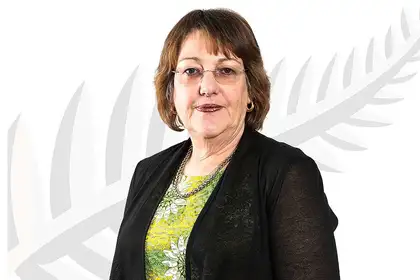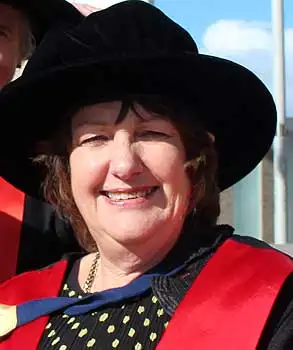
Dr Johanna Wood, who researched issues for teachers in teen parent units, has become the first woman to head NZ Football.
New findings on the little-researched area of teachers in teen parent units (TPUs) has revealed a perception of isolation from the mainstream school system and a lack of professional learning opportunities that could be impacting on student learning.
TPUs are holistic education units for teenage mothers that provide access to education and childcare. Dr Johanna Wood’s Doctor of Education thesis, The Professional Learning Landscape of Teen Parent Educators in New Zealand, found that TPU teachers feel “out of sight, out of mind”.
Dr Wood, who graduated from Massey University this year and has recently been chosen as president of the executive committee of New Zealand Football – the first woman to hold the role and the only woman on the FIFA council – says there is no specialist training for TPU teachers. While they are qualified primary or secondary teachers, they often deal with more complex pastoral care issues.
Not only do they need to be empathetic and flexible in accommodating the realities of teen parents’ needs, such as missing class to care for a sick child, they are often required to be responsible for teaching several subjects and to teach by distance. However, many were not using digital technology to the same degree as mainstream teachers due to lack of professional learning opportunities, Dr Wood found.
“It’s really an under-researched area,” she says. “We’re talking about our most vulnerable students from a learning perspective and yet what do we actually put in as support?”
Her research ultimately delves beyond the negative perceptions of alternative education. She says in the study that “the blame is often on low socio-economic strata for students’ failure to learn, rather than a probe into systemic factors that can impact on student outcomes factors such as tracking students, inequalities in financing the alternative environment, lack of curriculum differentiation and teacher quality.”
For instance, there are different demands on TPU teachers. “They require skills such as conflict resolution, social work, and counselling,” says Dr Wood, who investigated three TPUs – semi-rural, semi-urban and urban, through semi-structured interviews.
Although teen parent units are attached to, and under the governance of, mainstream secondary schools, they are often located off-site. This can create a sense of disconnection from being part of a larger teaching team, with access to professional learning, and the fostering of teacher inquiry as a way to develop teaching practice.
However, Dr Wood, a former secondary school principal and teacher who completed her doctoral thesis through the Institute of Education at Massey’s Manawatū campus, says she wanted to challenge TPU teachers’ perceptions that they are inherently different. She decided to pursue the topic after working in a National Schooling Improvement Project, where teachers in charge of TPUs attending a national hui in 2009 challenged Dr Wood and other facilitators of “not knowing what their world was like.”
“I’ve had a number of conversations and said [to teachers] ‘you are a teacher of a young person and the only difference to a mainstream school is that the young person has a child.’”
Her key findings and implications included:
- the need to take into consideration the part-time nature of staff and address the potential isolation barriers, whether they are geographical or professional
- the need to explore the use of digital networks to connect educators, who are likely to be the sole teacher of a discipline, to minimise both geographical and professional isolation
- the need for alignment with the governing school and professional learning policy.

Doctor of Education graduate Johanna Wood.
History of teen parent units in NZ
There are approximately 25 teen parent units in New Zealand, varying in size from 20 to 50 pupils. Most have early education facilities attached for the teens’ infants.
The first community based TPU was established in 1994 by Porirua College as a school within a school, says Dr Wood. “Responding to a high incidence of teenage mothers who were known to have dropped out of school, the purpose of the unit was to provide a holistic alternative for teen mothers to access education and gain qualifications. A number of other community based TPUs followed, each with their own unique character in response to local community needs.”
These early teen parent initiatives were funded from the social welfare budget, and it was not until 2004 that the resourcing of TPUs fell under the education budget. An association of teen parent educators runs a bi-annual conference, but Dr Wood found outside of this, there is a lack of ongoing regular contact and sharing of ideas between teen educators.
Since graduating Dr Wood, who retired from Massey’s Centre for Educational Development in the Institute of Education in 2015 to complete her doctoral research, has been busy travelling the globe in her new role as president of the executive committee of New Zealand Football and one of three FIFA council members for Oceania Football. The former school teacher and principal, education academic, dairy farmer and mother of four is the first woman chosen for the role representing both New Zealand and Oceania on FIFA.
“It’s a bit like being a suffragette,” she says. “I never thought there would still be some firsts in this day and age!”